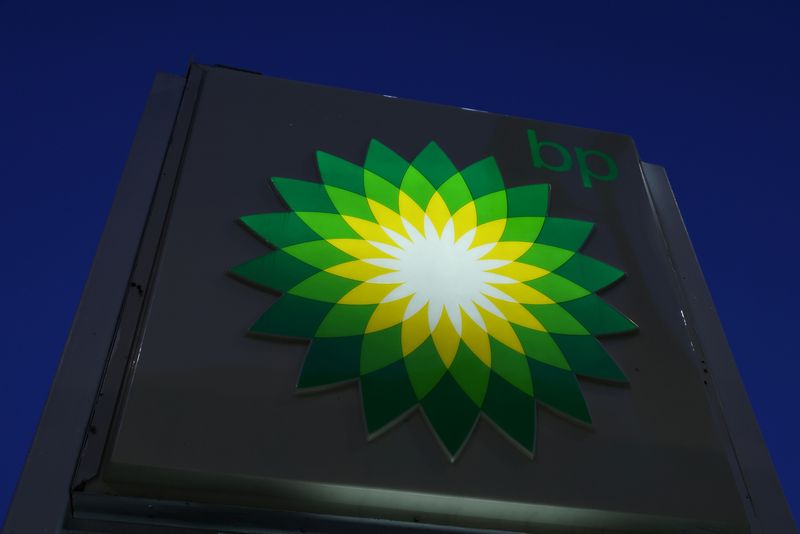By Sarah McFarlane, Anousha Sakoui and Ron Bousso
(Reuters) -The United Arab Emirates’ state-owned oil company recently considered buying Britain’s BP (NYSE:) but the deliberations did not progress beyond preliminary discussions, people familiar with the matter told Reuters.
Abu Dhabi National Oil Company (ADNOC) ultimately decided BP would not be the right fit for its strategy, three people said. Political considerations also weighed on the potential move, one of the people said.
The 88 billion-pound ($110.3 billion) company has underperformed its competitors for years, which investors and analysts say has made the British firm a potential takeover target. U.S. oil giants are in the midst of the industry’s biggest consolidation for decades, but European oil majors have to date not been involved.
Investors have penalized BP’s plan to reduce fossil fuel production and its faster shift toward renewables than rivals such as Shell (LON:), Exxon (NYSE:) and Chevron (NYSE:). In February 2023, BP rowed back on its more aggressive energy transition plans.
ADNOC, in contrast, has increased oil and gas production capacity and CEO Sultan al-Jaber is seeking to reshape the state giant in the image of a global oil major. The company, which is not publicly traded, is big enough to consider acquiring the smaller of the oil majors, BP.
ADNOC and BP spoke directly in recent months and ADNOC also sought advice from investment banks on a potential deal, two of the people said.
The Emirati giant considered all options when looking at BP, including buying a big stake, a fourth person said.
Large companies typically evaluate the market value and strategic worth of rivals for potential acquisitions. BP was one of many companies ADNOC has looked at, the person added.
“It didn’t go far,” the person said of the considerations over buying BP.
ADNOC has also looked at other international companies to give it access to a bigger gas and liquefied (LNG) portfolio, the person added.
ADNOC declined to comment for this story. A BP spokesman and a spokesman for Britain’s business ministry also declined to comment.
BP’s UK shares rose by as much as 2.5% in early trade Friday to 533.9 pence per share, their highest level since October, outperforming a 0.8% rise in the broader and a 1.3% rise in competitor Shell
BP’S VULNERABILITY
The considerations underscore ADNOC’s ambitions to expand internationally as part of the UAE’s energy transition strategy. It also highlights BP’s vulnerability as investors question its plans.
ADNOC previously told Reuters it is pursuing investment opportunities in areas including renewable energy, gas, petrochemicals and liquefied natural gas as part of its international expansion. ADNOC sees those sectors as key future growth markets.
ADNOC has been pursuing a series of European assets. Last year it made a non-binding bid of about 11.3 billion euros ($12.1 billion) to acquire German plastics and chemicals maker Covestro. It has also been in talks with Austria’s OMV to create a chemicals giant with combined annual sales of more than $20 billion.
In December, it agreed to buy European chemical producer OCI’s stake in ammonia and urea producer Fertiglobe for $3.6 billion.
BP, which reported profits of $13.8 billion last year, is valued at the lowest multiple amongst the global oil majors when measured by market capitalisation versus cashflow. The gap between BP’s price-to-cashflow ratio on a 12-month forward basis and that of rival Shell has widened in recent months to levels not seen in years.
Jefferies analyst Giacomo Romeo said that although BP’s shares are trading at “a clear valuation discount relative to peers,” the company has “an attractive set of assets including good growth opportunities in its upstream portfolio and a best-in-class trading business.”
BP Chief Executive Murray Auchincloss took the top job in January, succeeding Bernard Looney who was dismissed in December for lying to the board over personal relationships with colleagues.
UBS analyst Joshua Stone said ADNOC’s move highlights the view that the European oil and gas sector remains undervalued.
“The key question now is if BP can convince the market of the growth still to come from their transition businesses,” Stone told Reuters.
BP and ADNOC have been working together for more than 50 years.
In February, they announced a joint venture to develop gas assets in Egypt. The two also made a $2 billion offer to buy a 50% stake in Israeli gas producer NewMed last year, although the deal is on hold due to the conflict in the region.
Britain’s National Security and Investment (NSI) Act came into force in 2022, giving the government power to intervene in acquisitions on national security grounds in industries including energy.
UK governments have in the past told London-listed BP that they would block any takeover attempts by foreign entities given the company’s strategic value, people familiar with the matter told Reuters. It is unclear whether the current government would take the same position.
The UAE has expressed interest in investing in UK nuclear power infrastructure, sources told Reuters last month.
The UK government last month in effect killed a UAE-led takeover of newspaper the Telegraph, and plans to ban foreign governments from owning newspapers.

($1 = 0.9314 euros)
($1 = 0.7977 pounds)

